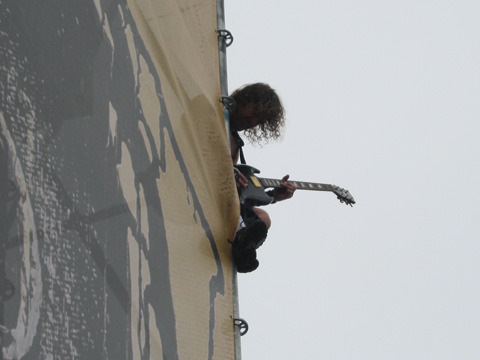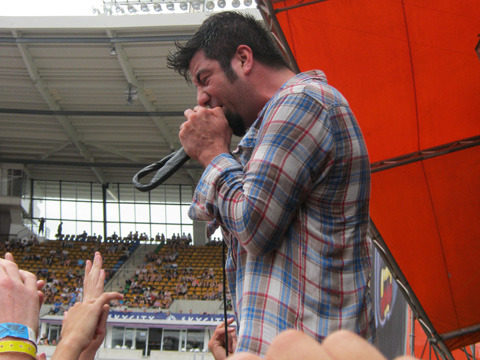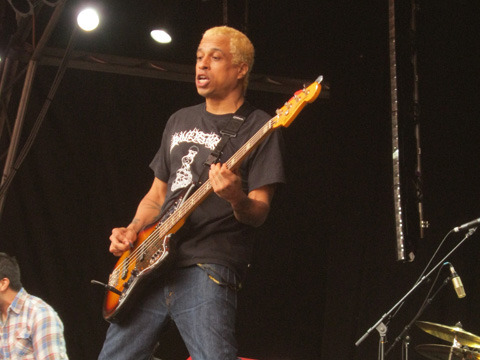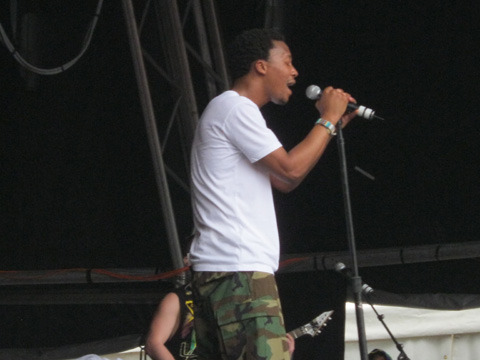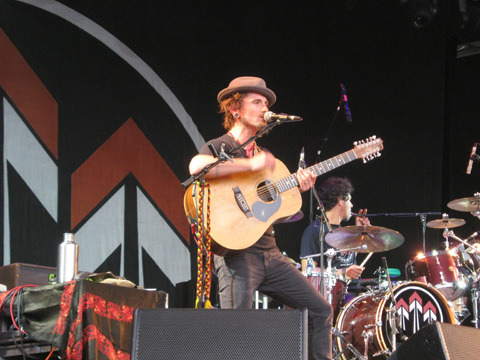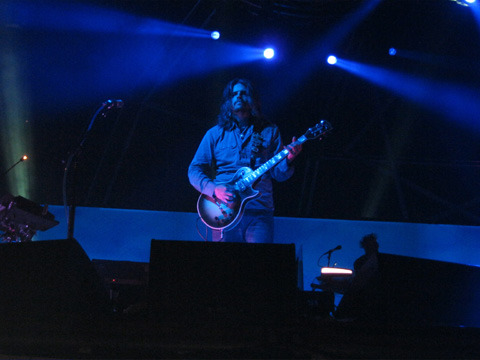You are part of the Treated Crew, tell us about the group and how you got involved with them?
Nez: The Treated Crew is basically a group of cats that were already cool. We were already friends, we already worked together and did music together. But basically everybody decided to unify, to come together, to come in this game stronger. Million $ Mano came to us both and was like “yo listen this is the movement.” He had just come back from the first leg of the Watch The Throne tour and was like “this is the movement G, let’s do it,” and everybody was just like down with it, you know what I mean. It was just a dope idea for all of us young dudes from Chicago to come together and show people that we all rock together and do some positive shit.
Rio: It was also at a perfect time because we were already talking about doing something else that was unified, kind of like a collective. Those are really just our homies growing up. For instance when we were young we were all breakdancing and rapping together, and those were all the same dudes in the cipher. This is really just kind of like a label. You know at the end of the day, we were really already on that same shit. We were already rocking together, it’s just a label that visibly works. It makes our individual work a lot stronger as eclectic music.
Obviously there’s a lot of young talent coming out of Chicago. What did you think of the lack of Chicago artists on the 2012 XXL Freshman cover?
Nez: You know with those things it just seems to be the outside looking in. A lot of times it seems like those things seem to be label pushed or whatever. I don’t think that’s the end or be all. Because the XXL cover came out and no one from Chicago is on it, that really doesn’t mean anything at the end of the day, it’s just publicity.
Rio: The XXL cover to me is like a weather forecast. How often is your weather forecast right? You know what I mean? So really at the end of the day like sometimes it’s right, sometimes it’s not. And if you feel like it’s not, that should serve as your personal motivation to turn up your situation. If you’re not making enough noise personally then you need to turn it up, make people realize what’s going on.
You’ve worked with YP, King Louie, Chance the Rapper, Freddie Gibbs etc. Do you have any favorite collaborations?
Rio: I would say actually (Treated Crew’s) Mr Take Your Bitch is one of my favorites because it gives us the chance to work with all of our homies on one record. That has a lot people from our crew on there.
Nez: The Louie shit is hard too I like that. Louie has this joint we did with him called Band Nation. It’s going to be one of the next singles coming out real soon. That was dope too. But yeah everybody man. It’s cool working with everybody, I really like what’s going on in Chicago right now. It’s good energy. Everyone seems to be working and just on it, trying to get better.So that’s really dope.
You recently produced two tracks on Schoolboy Q’s album, how did that come about?
Rio: We gave the beats to him in person. Him and Kendrick Lamar came to Chicago. We tried to find out a way to actually get to their camp. We knew that they were coming in town and sought out their contacts and tried to find out who’s bringing them in and all that kind of stuff.
A good friend of ours is Hustle Simmons, he actually linked us with J Script and he told he was going to have a listening session for Kendrick to come here and listen for beats, I think for Section 80. I guess this was his last chance to listen to beats for Section 80 from Chicago artists or whatever. The whole TDE clique came through and Q was actually there. I was familiar with Schoolboy Q through Setbacks and Michael Jordan. I was already a fan of his too, so when we were in the session exchanging contacts and music after we were chosen as a beat to listen to, I reached out to Q as well.
I was like “Yo Q, you know what’s good with you?” Cause you know, he was right there. And he was so dope to me even then that I wanted to work with him. We exchanged contacts with him, so he was like yeah “I’m going to choose some beats out of that group” and Druggies With Hoes Again was actually one of the beats that got played that night, that they chose. He ended up taking that and then we kept in contact and that’s how NiggaHs Already Know came to be too.
Do you ever feel disappointed with the way an artist has used your beat?
Nez: There has been sometimes when you’ve felt like maybe it could have been executed better, but I think recently the artists we have been working with have been knocking the beats out of the park.
Rio: I guess the more you do, the more artists tend to trust you and trust your opinion and your artistic direction for what the song should sound like. The more communication and trust that’s thrown around, usually the better the record. Sometimes you have the opportunity to work with a phenomenal artist like Schoolboy Q, where you can send a beat in an email and you know that it’s going to come back dope. But every artist isn’t quite like that, some people need you to give them the flow or give them a hook.
Who are you working with in the future?
Rio: Ourselves. We’re actually working on our second mixtape. As of right now, it doesn’t hold a title. We’re not positive that it’s going to be a Let’s Get Ill 2. I’m not quite sure if we want to do a sequel or something different, but the music that comes out is going to determine what kind of project it’s going to be. Look for more collaborations with Treated Crew and Schoolboy Q.
You both rapped on your mixtape Let’s Get Ill instead of using guest features, which is quite a surprising choice for producers. Why did you decide to rap personally on the album?
Nez: We always had the idea of being artists, because we’re the kind of producers that when we make the beat we are thinking about the entire song as it’s going along with the hook, the flow, what it should sound like. We already have that idea in our head and then a lot of times where it just got to a point where we felt like we had something we wanted to express in another outlet. It was just a time where we felt like we wanted to get an idea off and that was what came out.
Rio: Yeah, we’ve been rapping, writing and singing for a while. It just wasn’t public. That’s kind of like the thing with us, we like to work on something behind the scenes until we feel like it’s ready to be exposed. I think that’s one of the good things about us, until we feel like something is good enough to put out there we’ll just let it cook.
You guys are also making a documentary. Can you tell us what that’s about?
Nez: That’s basically going to give you a little insight into how we live, our personalities, get a chance to see who we are as people, as artists as producers. Just like more of a day to day insight to what we are about, you get to learn more about Nez and Rio.
Rio: Yeah, more about our creative process. Some stuff has to stay classified like as a result of us being evil wizards that just come up different techniques or whatever. Some stuff you just want to keep to yourself. But other things you know, there are definitely going to be windows into our world when it comes to our lifestyle.
Sounds like you are very busy at the moment. Are you both producing full time or working on the side as well?
Nez: Right now we are still working regular jobs to make ends meet. The artists that we have been producing, you know most of the stuff is digital. Digitally released. So we are still up and coming, very much so. But that’s temporary, we are working pretty hard to make this happen. I always say we are producing full time, that’s what we’re doing. Everything else is just part time









